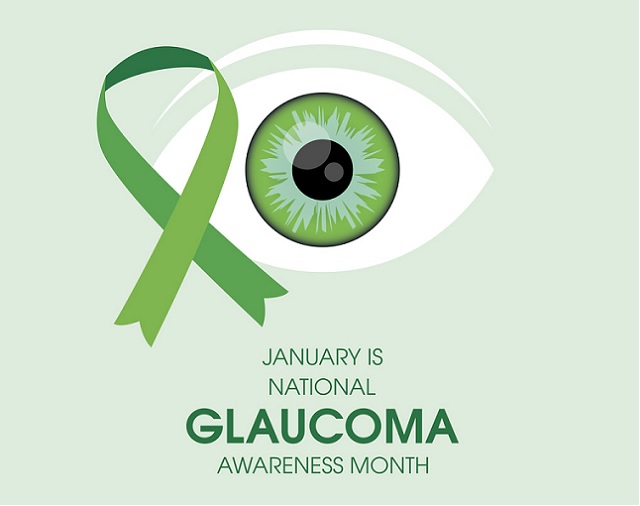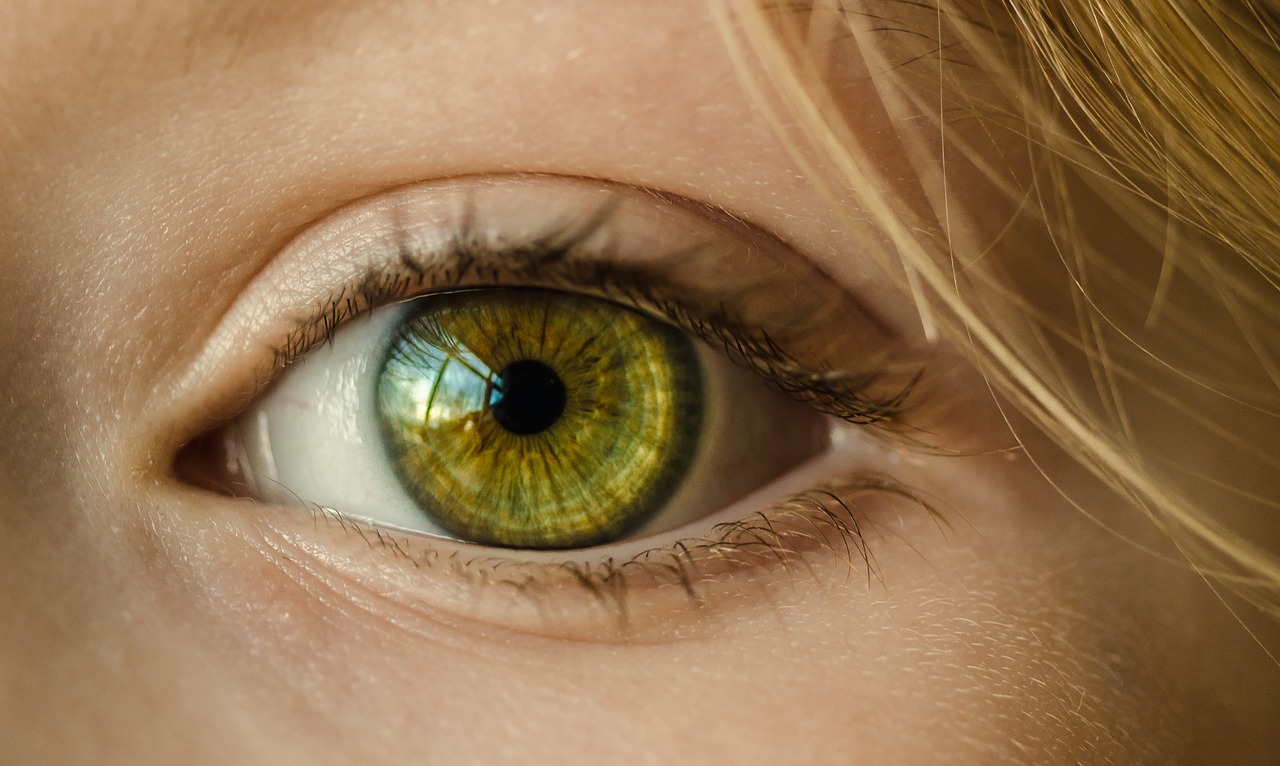
Musicians who play high-resistance wind instruments may be predisposed to glaucoma, according to mounting evidence. It is especially true for musicians in brass bands.
January was Glaucoma Awareness Month in the USA so there was no better time to find out more about the condition in the UK and in particular the brass banding community.
Eye condition
In 2000 Prof Gunnar Schmidtmann of Plymouth University began an investigation into the link between Intraocular pressure (IOP) fluctuations in professional brass and woodwind musicians during common playing conditions.
According to the NHS, glaucoma is a common eye condition that occurs when the optic nerve, which connects the eye to the brain, becomes damaged. It's usually caused by fluid building up in the anterior chamber located in the front part of the eye.
This causes the pressure inside the eye to rise, which can cause glaucoma to develop. Glaucoma is a group of eye diseases that can cause people to lose their sight or even go blind.
Ask the experts
The multi award-winning optician Allegro Optical, has a highly respected reputation for looking after the eye care needs of musicians and the team are well aware of Professor Schmidtmann's research and have worked with him. In fact, he even shared a stage with Allegro Optical at the UK’s first Visual Health in Performing Arts conference in York last year.
According to the NHS, glaucoma is a common eye condition that occurs when the optic nerve, which connects the eye to the brain, becomes damaged.
The optometrists at Allegro Optical see a great many musicians every week. No matter how old they are, they always measure the IOP of all brass and wind musicians.
Puff of Air
Speaking to 4BR, Senior Optometrist and clarinettist Elizabeth Holmes said; “In general, optometrists are not required to measure IOP in patients under the age of 40 unless they are in an at risk group, we check all wind instrumentalists, just in case”.
IOP is usually measured by optometrists using non-contact tonometry (NCT), often known as the "puff of air’ test, although we now use a device called an iCare tonometer which measures pressure using a rebound measuring principle that requires no drops or blasts of air.
Pressure
Sheryl Doe BSc FBDO, 2019 Dispensing Optician of the Year gave a further explanation.
“The technique of playing a brass instrument results in the body performing a Valsalva manoeuvre when it encounters certain stimuli. Wind instrumentalists take a breath, but there is a little pause before they begin playing as their tongues rise and lock in place, creating raised air pressure in their mouth.
Professor Schmidtmann's detailed research has shown that playing notes with high resistance and volume greatly increases this intraocular pressure.
As a result, the intraocular pressure of the eye increases. High-resistance wind players experience a greater increase in intraocular pressure than low resistance wind players.”
Professor Schmidtmann's detailed research has shown that playing notes with high resistance and volume greatly increases this intraocular pressure.
Players with higher wind resistance instruments see a bigger rise in IOP than those with lower resistance instruments.
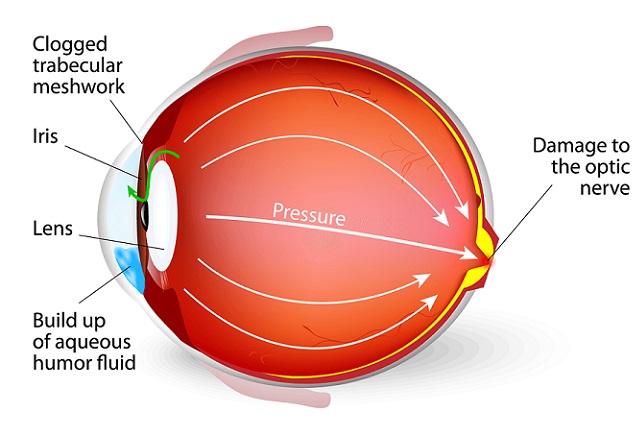
Largest spike
Sheryl added: “Wind musicians who played high resistance instruments, such as the cornet often have a higher incidence of visual field loss (loss of peripheral vision). Long-term intermittent spikes in IOP while playing high-resistance wind instruments, may produce glaucomatous damage that could be misdiagnosed as normal-tension glaucoma”.
Of the musicians tested as part of Professor Schmidtmann's study, a trumpet player had the largest IOP spike.
Of the musicians tested as part of Professor Schmidtmann's study, a trumpet player had the largest IOP spike.
“We see smaller, but still significant IOP increases, for soprano and alto saxophonists, French horn players, soprano cornet players and oboists”. Said Sheryl
When a performer stops blowing into the instrument, the IOP usually returns to normal. As yet no one knows exactly how common glaucoma is among high-resistance wind instrument players, but awareness and recording of it is certainly growing.
What exactly is glaucoma?
Glaucoma is not a single disease: It is linked to a number of eye conditions that cause it by gradually damaging optic nerve cells. The optic nerve transmits visual information from the eye to the brain where it is interpreted.
The interior of the eye is filled with vitreous, a jelly-like substance. The anterior chamber of the eye is filled with a watery fluid called aqueous humour, which not only nourishes the cornea and lens but also maintains the eye's structure. This fluid pressure is referred to as intraocular pressure (IOP).
The ciliary body, a gland located behind the eye, produces aqueous humour. After feeding the cornea and lens, it drains via the trabecular meshwork; a thin, spongy tissue about one-fiftieth of an inch broad. If this drain clogs, aqueous humour cannot escape the eye at its usual rate. As a result, fluid accumulates and the pressure in the eye rises.
Who is at risk of developing glaucoma?
Sheryl explained; “A few risk factors exist for developing glaucoma. People with certain medical conditions, such as diabetes, are at a higher risk, as are those with a family history of glaucoma. African-Caribbean people are four times more likely than Caucasians to develop it.
The risk can also be influenced by someone's prescription. Myopia (short-sightedness) increases the risk of developing primary open-angle glaucoma. Angle-closure glaucoma, on the other hand, is more common in long-sighted people (who require glasses for near tasks).
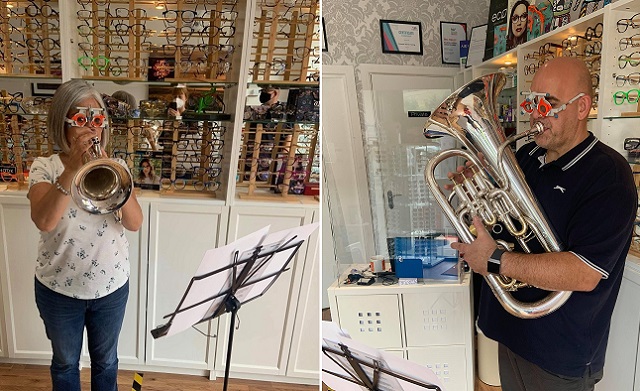
Star players such as Helen and Glyn Williams have sought expert eye care
People who have had previous eye injuries or who have used steroids for a long time are also at a higher risk of developing glaucoma.”
Optic nerve damage is a defining characteristic of glaucoma, often only detected with an Optical Coherence Tomography (OCT) scan. The nerve deteriorates gradually, resulting in loss of peripheral vision in the visual field. And although the exact cause is sometimes difficult to determine, rising intraocular pressure can undoubtedly contribute to this damage.
One pair of eyes
Sheryl explained what to do to ensure good eye health: “We all want to have the longest possible musical career because we all recognise that music is more than a hobby; it is a passion, a way of life. To make music we need to see the music, so these are my tips to look after your eyes.”
● Maintain regular eye examinations, at least every two years.
● If you have a family history of glaucoma, you should undergo an annual eye exam.
● Always opt for an Optical Coherence Tomography (OCT) scan as part of your eye exam. This can detect glaucoma up to four years earlier than a conventional NHS sight test.
● Eat plenty of colourful fruit and vegetables, especially leafy green vegetables.
● Staying healthy and maintaining a healthy weight by regular and moderate exercise.
● Drink coffee and tea in moderation.
● Smoking should be avoided.
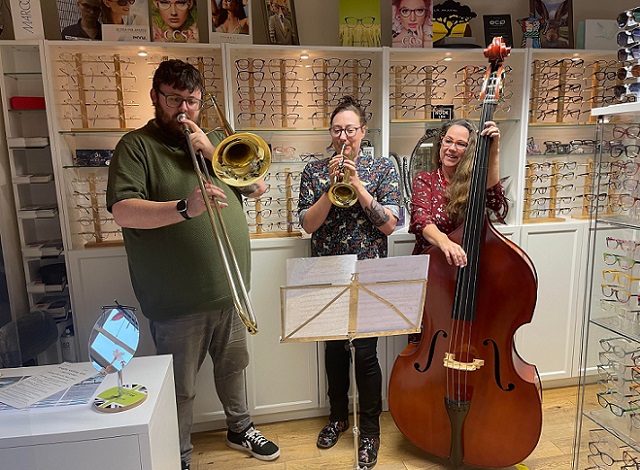
The Allegro Optical team also have a great deal of musical experience
Get examined
Sheryl added: “If you haven’t had an eye exam in the last two years, now is the time to book an appointment for a thorough check up. It may be the best thing you will do to keep enjoying your playing for years to come.”
Sheryl Doe is a trailblazing dispensing optician who specialises in the eye care needs of performing artists. She is a frequent speaker at optical and performing arts conferences, and she and her husband, musician Stephen Tighe, own three optician practices in the North of England.
If you haven’t had an eye exam in the last two years, now is the time to book an appointment for a thorough check up. It may be the best thing you will do to keep enjoying your playing for years to come
Appointment
In 2019 and 2021, the company won the coveted dispensing optician of the year award.
Allegro Optical was also named Best New Business Arts and Entertainment Business of the Year in 2019 and remains the UK's only BAPAM-registered optician. In February, Allegro Optical in Marsden won the coveted Optical Practice of the Year at the 2023 Eye Care awards in Glasgow.
To make an appointment with a performing arts eye care specialist, call Allegro Optical in Greenfield 01457 353 100, Marsden 01484 76 88 88, or Meltham 01484 90 70 90
Iwan Fox
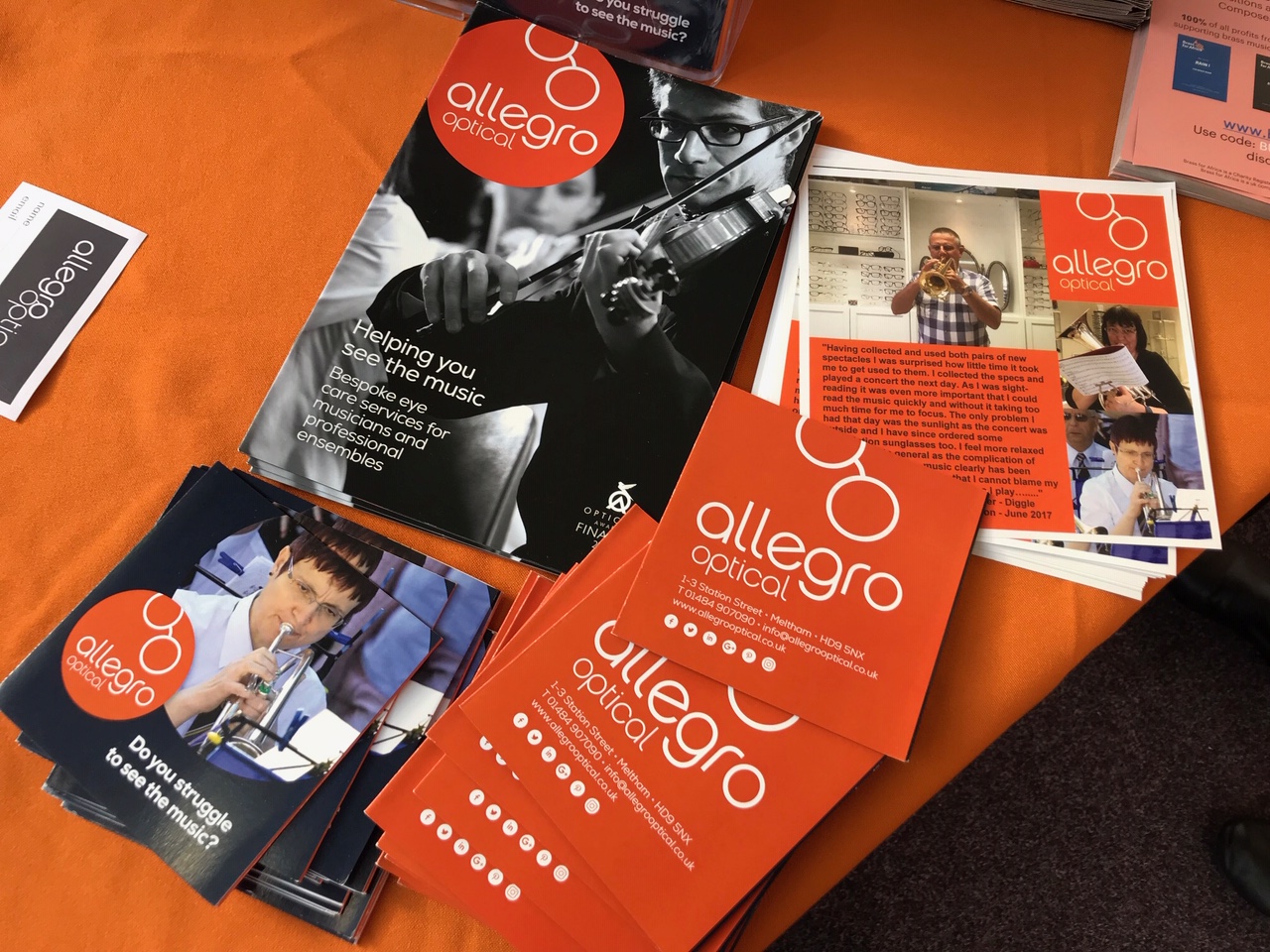
Sheryl Doe BSc FBDO,
Managing Director - Dispensing Optician of the Year 2019
Allegro Optical Ltd
1-3 Station Street, Meltham, Holmfirth, West Yorkshire, HD9 5NX.
Tel: 01484 90 70 90
Allegro Optical (Saddleworth) Ltd
1 The Greenfield Center, Wellington Road, Greenfield, Oldham, OL3 7AJ
Tel: 01457 353 100
Allegro Optical (Marsden) Ltd
30 Peel Street, Marsden, Huddersfield, HD7 6BW
01484 76 88 88
2020 Vision Labs
30 Peel Street
Marsden
Huddersfield
HD7 6BW
01484 556818



